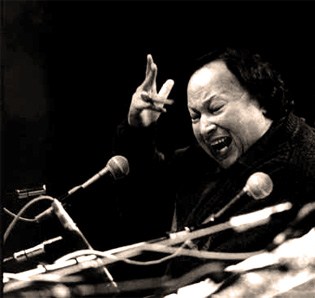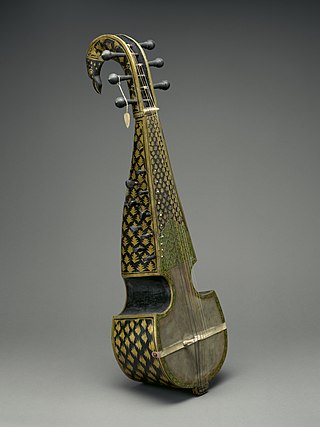Related Research Articles

Ustad Nusrat Fateh Ali Khan was a Pakistani singer, songwriter, and music director. He was primarily a singer of qawwali — a form of Sufi devotional music. Often called the "Shahenshah-e-Qawwali", he is considered by The New York Times to be the greatest qawwali singer of his generation. He was described as the fourth greatest singer of all time by LA Weekly in 2016. He was known for his vocal abilities and could perform at a high level of intensity for several hours. Khan is widely credited with introducing qawwali music to international audiences. He was also a master in Hindustani classical music.

The music of Bangladesh spans a wide variety of styles. Bangladesh claims some of the most renowned singers, composers and producers in Asia. Music has served the purpose of documenting the lives of the people and was widely patronized by the rulers. It comprises a long tradition of religious and regular song-writing over a period of almost a millennium.

The sarod is a stringed instrument, used in Hindustani music on the Indian subcontinent. Along with the sitar, it is among the most popular and prominent instruments. It is known for a deep, weighty, introspective sound, in contrast with the sweet, overtone-rich texture of the sitar, with sympathetic strings that give it a resonant, reverberant quality. A fretless instrument, it can produce the continuous slides between notes known as meend (glissandi), which are important in Indian music.

Ali Akbar Khan was an Indian Hindustani classical musician of the Maihar gharana, known for his virtuosity in playing the sarod. Trained as a classical musician and instrumentalist by his father, Allauddin Khan, he also composed numerous classical ragas and film scores. He established a music school in Calcutta in 1956, and the Ali Akbar College of Music in 1967, which moved with him to the United States and is now based in San Rafael, California, with a branch in Basel, Switzerland.

Mahbubul Haque Khan, best known as Azam Khan, was a Bangladeshi singer-songwriter, record producer, and lead singer for the pop-rock band (Uccharon). He was also a freedom fighter. He took part in the Liberation War of Bangladesh in 1971. He is considered to be one of the greatest artists in the history of Bangladeshi folk music

Allauddin Khan, also known as Baba Allauddin Khan was an Indian sarod player and multi-instrumentalist, composer and one of the most notable music teachers of the 20th century in Indian classical music. For a generation many of his students, across different instruments like sitar and violin, dominated Hindustani classical and became one of the most famous exponents of the form ever, including Ravi Shankar and Ali Akbar Khan.

Ustad Amjad Ali Khan is an Indian classical sarod player, best known for his clear and fast ekhara taans. Khan was born into a classical musical family and has performed internationally since the 1960s. He was awarded India's second highest civilian honor Padma Vibhushan in 2001. India's Third highest civilian honor Padma Bhushan in 1991 and Padma Shree in 1975.

Annapurna Devi was an Bengali Indian surbahar player of Hindustani classical music. She was given the name 'Annapurna' by Maharaja Brijnath Singh of the former Maihar Estate (M.P.), and it was by this name that she was popularly known. She was the daughter and disciple of Allauddin Khan, and the sister of Ustad Ali Akbar Khan. Pandit Ravi Shankar was her first husband, with whom she had a son, Shubhendra Shankar, who was an artist and a sitaritst.

Ali Zafar is a Pakistani singer-songwriter, model, actor, producer, screenwriter and painter. He started out on Pakistani television before becoming a popular musician, later also established a career in Bollywood and his success led many Pakistani actors to venture into Hindi films. He has received five Lux Style Awards and a Filmfare Award nomination.

Shafqat Amanat Ali Khan is a Pakistani pop and classical singer, songwriter, and composer belonging to the Patiala Gharana tradition of music. He was the lead vocalist of the Pakistani pop rock band Fuzön until 2006 and is a prominent playback singer in the Indian film industry and Pakistani television industry. The youngest son of noted classical vocalist Ustad Amanat Ali Khan, Ali started his musical training at the age of four under the tutelage of his uncle, Ustad Bade Fateh Ali Khan, who was widely regarded as the foremost exponent of Hindustani classical music in Pakistan.

Farhan Saeed Butt better known by his stage name Farhan Saeed is a Pakistani singer-songwriter, actor and entrepreneur. Saeed is the former lead vocalist of the Pakistani band Jal and owns the restaurant Cafe Rock in Lahore. He sings in Urdu and Punjabi. He made his acting debut with the drama De Ijazat Jo Tu (2014).
Mobarak Hossain Khan was a Bangladeshi musicologist, musician, and writer. He played the surbahar, a bass version of the sitar.

Asad Ali Khan was an Indian musician who played the plucked string instrument rudra veena. Khan performed in the style dhrupad and was described as the best living rudra veena player in India by The Hindu. He was awarded the Indian civilian honor Padma Bhushan in 2008.
Phuljhuri Khan was a tabla and esraj player from Bangladesh. He was also an accomplished sanai, sitar, and pakhawaj player.

Ravi Shankar's Festival from India is a double album by Indian musician and composer Ravi Shankar, released on World Pacific Records in December 1968. It contains studio recordings made by a large ensemble of performers, many of whom Shankar had brought to the United States from India. Among the musicians were Shivkumar Sharma, Jitendra Abhisheki, Palghat Raghu, Lakshmi Shankar, Aashish Khan and Alla Rakha. The project presented Indian classical music in an orchestral setting, so recalling Shankar's work as musical director of All India Radio in the years before he achieved international fame as a soloist during the 1960s.

Alauddin Ali was a Bangladeshi music composer. He won the Bangladesh National Film Award for Best Music Director five times for the films Golapi Ekhon Traine (1978), Sundori (1979), Koshai (1980), Jogajog (1988) and Lakhe Ekta (1990). He won the Best Music Composer award for the film Laal Doriya (2002) and the Best Lyrics award for Premik (1985). Moreover, he won the Ifad Film Club Award and the Bachsas Award in the category of Best Music Director. He directed music for more than 300 films.

Khadem Hossain Khan (1922-1992) was a classical musician in Bangladesh.
Ayet Ali Khan was a Bengali classical musician.
Aftabuddin or Aftab Uddin may refer to:
References
- ↑ "Songs from the River called Titas". The Daily Star. 6 August 2016. Retrieved 14 September 2017.
- 1 2 3 Khan, Mobarak Hossain. "Khan, Fakir Aftabuddin". Banglapedia. Retrieved 14 September 2017.
- ↑ Rahman, Syedur (2010). Historical Dictionary of Bangladesh. Scarecrow Press. p. 173. ISBN 9780810874534 . Retrieved 14 September 2017.
- ↑ "Fakir Aftabuddin Khan: Musical Savant". The Daily Star. 25 January 2009. Retrieved 14 September 2017.